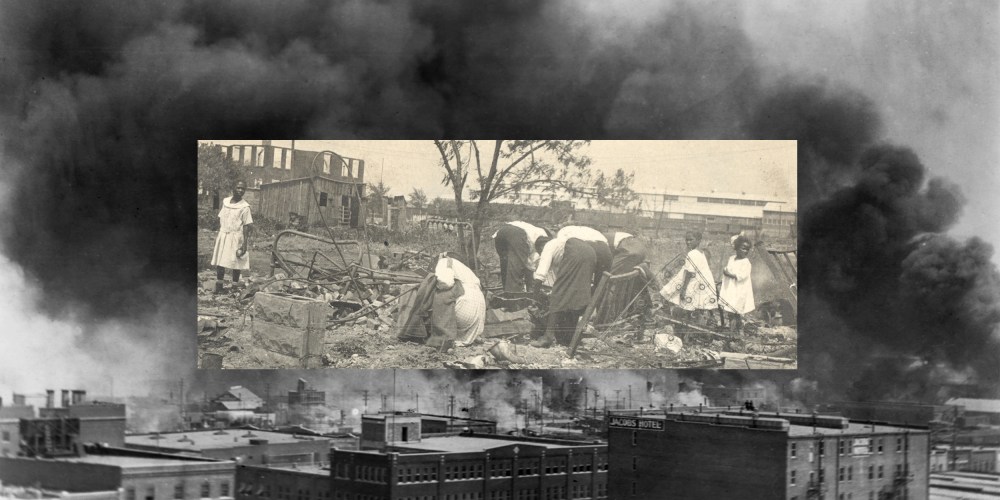At 106 years old, Lessie Benningfield Randle is one of the oldest known survivors of the Tulsa Race Massacre. And like so many others before her, she is demanding redress for the trauma she and her family endured, including the insurmountable loss of property.
According to a Washington Post-ABC News poll from July 2020, only 31 percent of Americans favor reparations.
The massacre in Tulsa, Oklahoma, didn’t only have a negative impact on the generational wealth in Randle’s family. It has also left a lasting mark where significant racial disparities still exist in the city’s Greenwood neighborhood, where the massacre took place 100 years ago.
The unrest began May 31, 1921, when a Black teenager named Dick Rowland was falsely accused of having assaulted a young white woman named Sarah Page. White residents, with support from law enforcement, unleashed violence and destruction in the Greenwood district, then known as “Black Wall Street.”

The actual death toll of the massacre remains unknown; historians estimate that as many as 300 Black residents died. There are efforts to find the rumored mass graves. Surviving records reveal that white mobs burned down more than 1,200 homes, businesses and Black-owned institutions, including churches and schools, representing millions of dollars in hard-earned Black wealth. The destruction displaced thousands of Black residents, who were forced to relocate to nearby states.
In recent years, survivors of the Tulsa massacre and their descendants have pointed to that moment in history to call for reparations as one step to redress the immense loss of Black life, property and wealth. Randle sued the city of Tulsa and other local government entities last year. Damario Solomon-Simmons, one of Randle’s attorneys, defended the lawsuit in a Los Angeles Times op-ed, writing, “At the national level, federal leaders need to support monetary redress for the intergenerational and continuing terror, trauma and economic discrimination inflicted on black Americans.”
The actual death toll of the massacre remains unknown; historians estimate that as many as 300 Black residents died.
For the last few years, Rep. Sheila Jackson Lee, D-Texas, has reinforced this point by leading a nationwide effort to obtain reparations for descendants of enslaved Black people. In April, the House Judiciary Committee voted to move forward with H.R. 40, which would establish a Commission to Study and Develop Reparations Proposals for African-Americans. The bill was first introduced in 1989 by Rep. John Conyers of Michigan as H.R. 3745, and Lee took up the mantle following Conyers’ resignation in 2017.
Named H.R. 40 to “memorialize the promise” of Gen. William Tecumseh Sherman’s Special Field Order (popularly known as the guarantee of “40 acres and a mule” for the newly freed population), the bill calls for the commission to study slavery and the varied forms of discrimination on the state and federal levels that African Americans have endured throughout history. The commission would then recommend “ways to educate the American public of its findings and appropriate remedies.”

The recent vote on H.R. 40 in the Judiciary Committee was historic, representing the furthest the bill has progressed since it was first proposed in 1989. But although calls for reparations are gaining some traction across the country, there is still much resistance to the idea.
A Washington Post-ABC News poll from July found that only 31 percent of Americans favor reparations — only 2 points higher than the previous year, when a Gallup poll found that only 29 percent of Americans support financial reparations. These figures represented some improvement from polling in 2002, which found that only 14 percent viewed reparations in a favorable light. Polls indicate that most Americans still resist the idea that the government should take tangible steps to redress centuries of abuse and exploitation. Many who resist reparations often suggest that it would be “too difficult” to administer at the national level; others opine that “it’s too late.”
We may never know the full extent of the atrocities that took place 100 years ago.
The case of the Tulsa massacre challenges these flimsy points. While some critics, like Black conservative Larry Elder, have quibbled about the challenges of identifying descendants of enslaved people, there is little murkiness about whose lives were deeply affected by the massacre in 1921. The decadeslong research of many scholars and journalists — including historian Scott Ellsworth, author of the newly released book “The Ground Breaking” — reveal that we may never know the full extent of the atrocities that took place 100 years ago.













